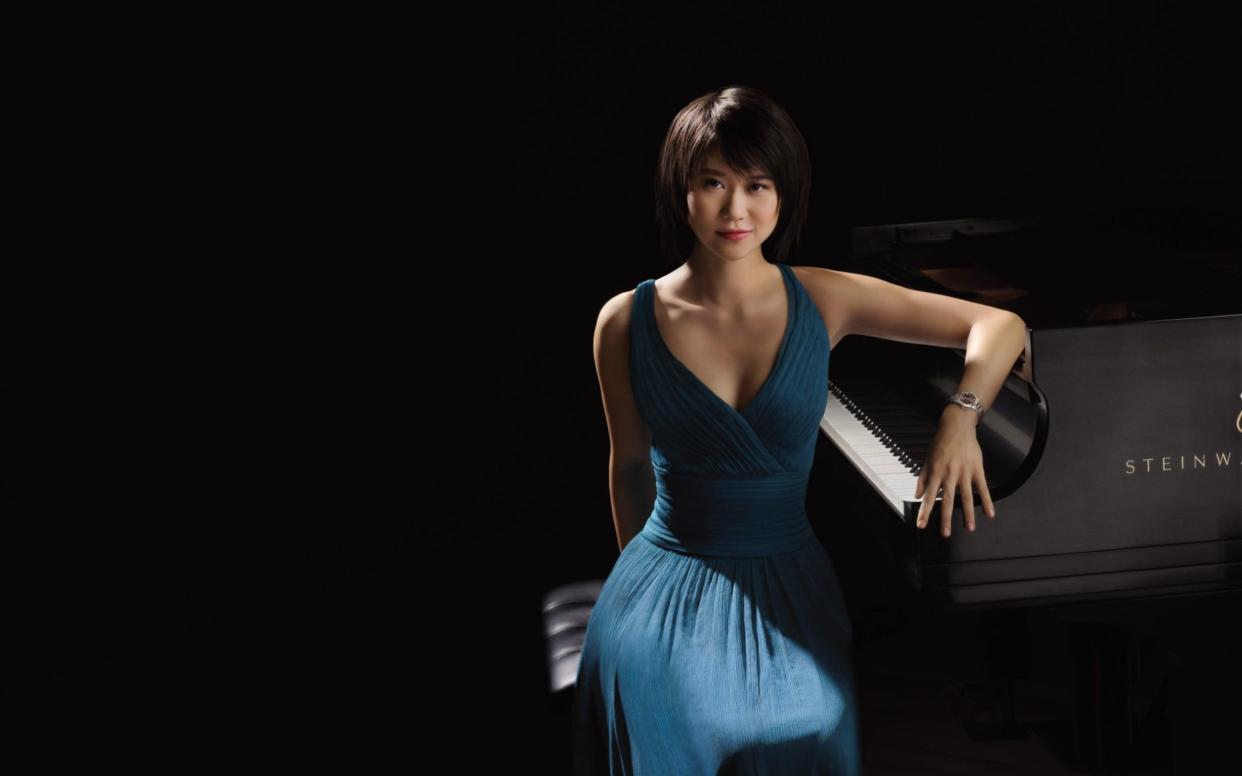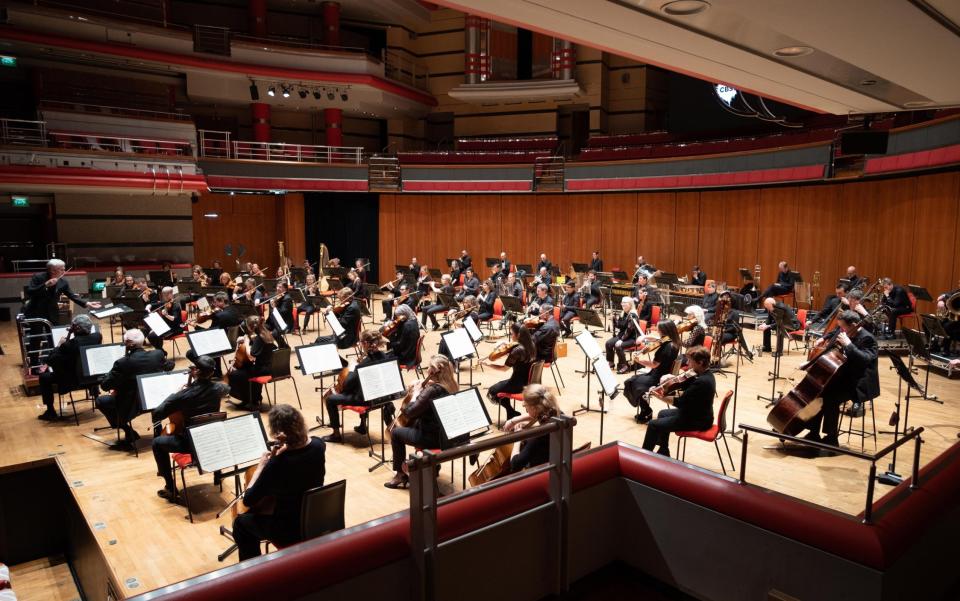An enervating vision of Beethoven's Fifth, plus the best of May’s classical concerts

LSO/Yuja Wang ★★★☆☆
“Love those shoes” murmured the woman next to me in the Barbican concert hall, as star Chinese pianist Yuja Wang teetered on stage in a shocking pink dress and the highest heels seen on that stage—since the last time she played there. It’s what Wang has always done, bless her, and for a dizzy moment it seemed as if the pandemic had never happened.
That was the smaller factor that made this concert feel like a musical comfort blanket. The larger one was the programme, which was even less taxing than the programme of cheerful crowd-pleasers Sir Simon Rattle conducted last week. It included two pieces in the top 20 of Classic FM’s Hall of Fame, Rachmaninov’s 2nd Piano Concerto and Beethoven’s 5th Symphony, plus to begin with Grieg’s exquisitely sentimental The Last Spring, played here by the strings of the London Symphony Orchestra under their one-time music director Michael Tilson Thomas with just the right lavender-scented tenderness. All this gave the lie to the oft-repeated demand that “normal” should never return in classical music, and that orchestras and venues must seize the opportunity of the pandemic to revolutionise the way they work. It positively screamed normality, and with good reason. It’s exactly what people need, in this strange time when live music-making has become a distant memory.
In any case Rachmaninov’s 2nd Piano Concerto, hackneyed though it is can actually be a joy, when it is played as well as it was on this occasion. Rachmaninov’s piano writing is so luxuriantly textured and the harmonies so sumptuous that the music can easily become glutinous, but Wang made it seem light and almost transparent. Rather than always seizing centre-stage she often cultivated a quietly musing almost diffident tone, especially in the slow movement which had a rare tenderness and intimacy. When she did summon the grandiloquent tone which the piece often needs she gave it an undertow of excitement. She never just sat back and revelled in the music; she was always urging it onwards so she almost got ahead of Tilson Thomas’s beat, giving Rachmaninov’s glittery roulades a coiled rhythmic springiness. The orchestra were on wonderful form too, with achingly beautiful solo playing from clarinetist Chris Richards.
Had the concert ended there I would have left the hall on a high. Instead I had to endure the enervating strangeness of Michael Tilson Thomas’s vision of Beethoven’s Fifth Symphony. Over the decades this piece has become leaner, airier and faster, as so-called “historically informed” ideas of performance have taken hold. I suppose some might admire Tilson Thomas for going against the new orthodoxy. But his tempos were so ostentatiously ponderous I found I was mentally always several pages ahead in the music, which is a disaster. Beethoven should be ahead of us, not the other way round. If nothing else, the performance proved that we’ve been changed for ever by “period performance”. Our musical pulse now runs quicker, and performances that go against that immoveable fact simply sound dull.
This concert will be broadcast at a future date. See lso.co.uk for details

CBSO/Edward Gardner ★★★★☆
We’ve been looking forward to it for so long, and suddenly it’s here: live concerts, happening in front of us, in concert halls, instead of on wretched little screens. The joy last night at Symphony Hall in Birmingham was palpable, but nevertheless it felt a touch muted. We were all in masks, and only one in three seats were occupied. And there was a touch of stunned disbelief in the air when conductor Edward Gardner told us the City of Birmingham Symphony Orchestra has gone more than 400 days without playing in front of an audience.
But the old training dies hard. The players were on cracking form, and they offered a programme that was appropriately affirmative and radiant, free of dark corners. It’s true that the first piece, Piano Concerto No 4 by Camille Saint-Saëns, did sometimes try to be serious, by settling down to Bach-like counterpoint. But this was soon dropped for a high-kicking galop, or tremulously sweet strings surrounding a soft-centred melody.
The soloist Stephen Hough played with nice irony, putting on a show of frowning seriousness and summoning up a huge tone in the serious bits, and then going all soft and insinuating and glancing up at Gardner with a naughty “get this!” grin, when a particularly luxuriant roulade came along. It was tosh, really, but very high-class tosh.
Saint-Saëns’s emotional ambivalence was straightforwardly enjoyable, but the ambivalence of the next piece, Violent, Violent Sea by the fortysomething Brooklyn-based composer Missy Mazzoli, was more a puzzlement than a joy. Gardner made an eloquent case for it, firstly in the pre-performance chat where he said it combined two sorts of Americana: the radiantly lyrical kind and the motoric, energetic kind.
That sounded intriguing, but despite Gardner’s ardent shaping of the piece, and the equally ardent playing of the CBSO, the two kinds of music seemed to tread on each other’s toes. Just as the music was aspiring upwards in that quintessentially American “shining city on the hill” manner, it would undercut itself with a louche vibraphone riff, or a sassy downward lurch in the bass. Some might say that’s more honest, but the expressive effect was frustratingly indecisive.
Finally came the evening’s indubitable masterpiece, Debussy’s “three symphonic sketches”, La Mer. Gardner clearly loves the piece, and wanted to make it more than the quicksilver, wind-and-spray impression one gets in many performances. The opening was grandly slow, and the extraordinary winding-down of tension at the end of the first movement more drawn-out than I’ve ever heard it. This was a weighty vision of the sea, more to do with vast depths than windswept surfaces.
It was often impressive, though at times the music’s eager onrush felt compromised. But like everything else we heard, it was always engrossing and intelligent, and played with real passion. And after such a long absence, just hearing live music again was like manna from Heaven.
The CBSO’s new season of live concerts runs until July 7. Info: cbso.co.uk


